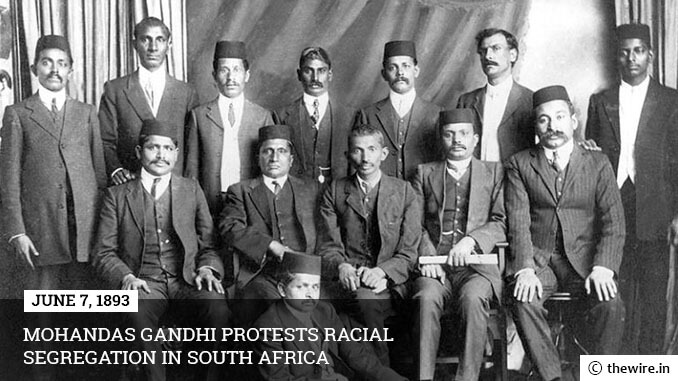On June 7, 1893, Mohandas Gandhi, one of the most influential non-violent leaders of the modern world, committed his first act of civil disobedience in South Africa when he voiced his protest against racial segregation. A young, idealistic lawyer, Gandhi was accepted a contract to work as a lawyer in South Africa for a year at the age of 24. Settling in Natal, Gandhi found that he was subjected to harsh South African laws that restricted the rights of Indians. On June 7, Gandhi boarded the first-class carriage of a train at the Pietermaritzburg Railway Station. Racial segregation was strictly adhered to at the time and Gandhi was asked to move to the third-class compartment due to his skin color. Holding a valid first-class ticket, Gandhi refused to comply and was pushed off the train in the middle of the night. Recalling the incident, Gandhi wrote in his memoirs, “I was afraid for my very life. I entered the dark waiting-room. There was a white man in the room. I was afraid of him. What was my duty? I asked myself. Should I go back to India, or should I go forward with God as my helper, and face whatever was in store for me? I decided to stay and suffer. My active non-violence began from that date.” The incident had a profound effect on Gandhi who decided to stay in the country and lead the civil disobedience movement against racial segregation. The incident inspired the young lawyer from India to fight injustice and defend civil rights of the people. Later, when Gandhi returned to India, it was his confidence in this satyagraha that propelled him to take up the leadership of the country’s independence movement. Mohandas Karamchand Gandhi was born in coastal Gujarat in India and coming from a rather affluent family was sent to study law in London. The British education strengthened his convictions and ideals of equality and justice. Despite the expiration of his work contract, Gandhi decided to stay on in South Africa and campaign against South African laws that were intended at depriving Indians of the right to vote. On August 22, 1894, he formed the Natal Indian congress (later known as the African National congress) to fight discrimination. As the Indian population in South Africa burgeoned, the Transvaal government stepped up restrictions on Indians. In 1906, Gandhi led the first satyagraha (mass civil disobedience) campaign and by 1914 succeeded in negotiating a compromise in favor of the Indians. In 1914, Gandhi returned to India. By the time India was in the throes of much oppression and violence perpetrated by the British colonists against the native Indians. Local freedom fighters such as Rani Laxmibai, Tatiya Tope, Mangal Pandey, Ram Prasad Bismil had offered some measure of resistance but much of it had been regional. A cohesive national force seemed conspicuously absent. Initially, Gandhi had taken to supporting British authorities but by the end of World War I, Britain embarked on a policy of mandatory military draft of Indians. This caused much outrage in the country. Emboldened by much of his success in South Africa, Gandhi initiated his satyagraha campaign. Hundreds of thousands resolved to tread Gandhi’s path of non-violent protest. While there were radical protests offered by those who did not commit to Gandhian ideals of ahimsa (non-violence), such as those by Bhagat Singh and Subhash Chandra Bose, Indians largely acknowledged Gandhi as the national leader at the forefront of the freedom struggle. Apart from leading the negotiations that led up to the partition and eventual independence, Gandhi was also at the helm of the leadership that decided on the constitution of the first cabinet of India. Gandhi’s ideals earned him the epithet Mahatma or ‘the great soul’. His civil disobedience promised a highly effective alternative to violent revolutions and inspired a number of civil rights movements across the world. Martin Luther King, Jr. and other leaders were greatly influenced by Gandhian doctrines. Also On This Day: 1862 – The United States and the United Kingdom agree to suppress slave trade. 1848 – French painter Paul Gauguin is born. 1913 – First successful ascent of Mt. McKinley. 1917 – The Battle of Messines Ridge begins. 1982 – Elvis Presley’s Graceland opens to the public for the first time.
June 7 1893 – Mohandas Gandhi protests racial segregation in South Africa
On June 7, 1893, Mohandas Gandhi, one of the most influential non-violent leaders of the modern world, committed his first act of civil disobedience in South Africa when he voiced…
